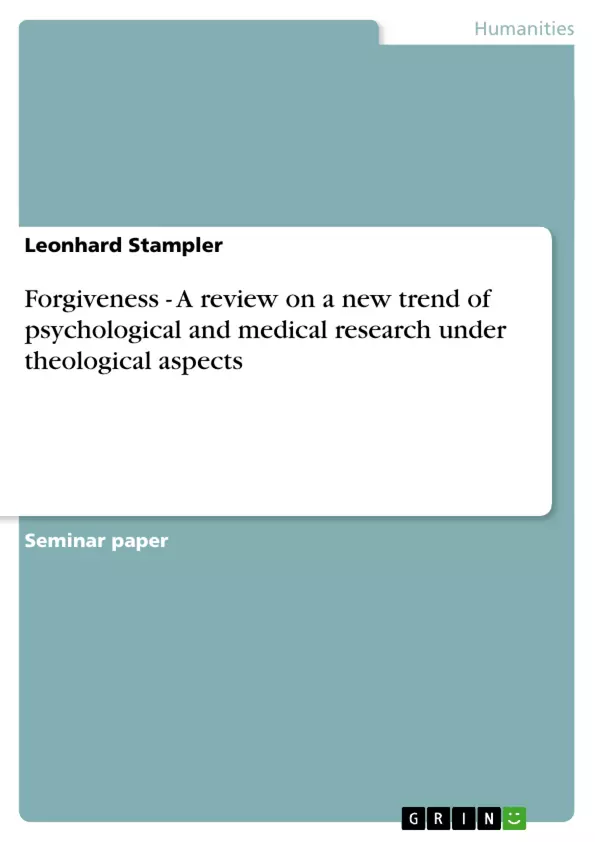While the concept of forgiveness is known to any Christian in the world, it is new to use this concept within psychology and psychotherapy. Physicians (Phillipps and Osborne, 1989) working with cancer patients and therapists (Kaufman, 1984; Fitzgibbons, 1986; Hope, 1987) who were looking for ways to efficiently reduce anger, recognized the utility of forgiveness. Since the last 20 years some American psychologists, psychotherapists and also medical doctors researched on this subject and many studies could show the effects of forgiving an offender to either mental and physical health.
The forgiveness-research is doubtlessly auch für die christliche Spiritualität und Verkündigung von Belang , because psychology can show that forgiveness is not only a matter of theological research and that there are other possible motivations to forgive than religious ones.
My work will describe some of the most important psychological studies of forgiveness in relation to mental and physical health. Furthermore I will describe some questions of the Christian community faced by the fact that the central faith proclamation is matter of empirical psychological and medical research.
Inhaltsverzeichnis (Table of Contents)
- Introduction
- Understandings of the concept of forgiveness
- Psychological definitions of forgiveness
- Arguments against Forgiveness
- The process of forgiving - a model
- Uncovering Phase
- Decision Phase
- Work Phase
- Outcome / Deepening Phase
- Christian understandings
- Published research on forgiveness and mental and physical health
- Forgiving and its effect on mental health
- Forgiving and its effect on physical health
- Reflections on the Christian community
- Empirical research versus theological inquiry
- Empirical research - a new apologetic?
- Empirical forgiveness research - motivation to forgive?
- Virtuous behaviours - positive health effect?
- Greater health benefits for believers?
- Personal reflections on the matter of forgiveness
Zielsetzung und Themenschwerpunkte (Objectives and Key Themes)
This seminar paper explores the concept of forgiveness, examining its psychological and medical aspects, particularly in relation to mental and physical health. The paper aims to provide an overview of recent research findings on forgiveness, contrasting these findings with traditional Christian understandings.
- Psychological definitions and models of forgiveness
- The impact of forgiveness on mental and physical well-being
- Theological perspectives on forgiveness
- Potential applications of forgiveness research in Christian communities
- The relationship between forgiveness and personal growth
Zusammenfassung der Kapitel (Chapter Summaries)
The paper begins with an introduction that establishes the growing interest in forgiveness within psychology and medicine. It then delves into various understandings of the concept of forgiveness, including psychological definitions, arguments against forgiveness, and a detailed model of the forgiveness process. This model, developed by Robert Enright, outlines four distinct phases: the Uncovering Phase, the Decision Phase, the Work Phase, and the Outcome/Deepening Phase.
The paper further examines published research on the effects of forgiveness on both mental and physical health, highlighting studies that demonstrate the positive impact of forgiveness on various aspects of well-being. The paper then transitions into a reflection on the implications of this research for the Christian community, exploring themes such as the potential for a new apologetic, the motivations for forgiveness, and the potential for greater health benefits among believers.
Schlüsselwörter (Keywords)
The primary keywords and focus topics of this seminar paper are: forgiveness, psychology, psychotherapy, medicine, mental health, physical health, Christianity, theology, empirical research, apologetics, virtuous behaviours, and personal growth.
Frequently Asked Questions
Is forgiveness only a theological concept?
No. While traditionally theological, forgiveness has become a significant subject of research in psychology and medicine over the last 20 years, focusing on its health benefits.
What are the four phases of the forgiveness process?
According to Robert Enright's model, the process includes the Uncovering Phase, the Decision Phase, the Work Phase, and the Outcome/Deepening Phase.
How does forgiveness affect physical health?
Studies indicate that forgiving an offender can reduce anger and stress, which in turn can lead to positive effects on cardiovascular health and the immune system.
What is the psychological definition of forgiveness?
Psychologically, forgiveness is often viewed as a prosocial change in motivation where the desire for revenge decreases and the potential for goodwill increases.
Why is forgiveness research relevant to the Christian community?
It provides empirical evidence for the benefits of a central faith proclamation and explores whether believers might experience greater health benefits due to their religious motivations.
- Quote paper
- Leonhard Stampler (Author), 2003, Forgiveness - A review on a new trend of psychological and medical research under theological aspects, Munich, GRIN Verlag, https://www.grin.com/document/22471



